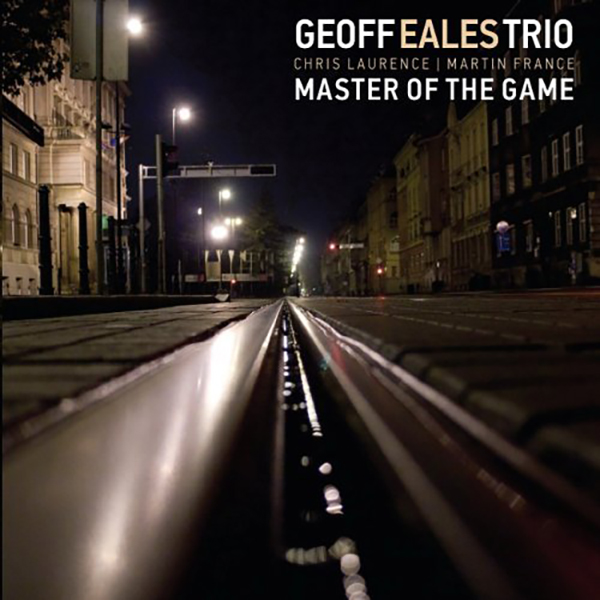
by Ian Mann
March 14, 2009
/ ALBUM
A highly distinctive album in an overcrowded field. It deserves to propel Eales into the piano premier league
Welsh born pianist Geoff Eales has been on the scene since the 1970’s but only started recording as a leader in 1999. He has mainly recorded in the piano trio format, most notably with bassist Roy Babbington and drummer Mark Fletcher, but there have also been a couple of solo piano ventures.
For “Master Of The Game” Eales has assembled a stellar new trio. Bassist Chris Laurence and drummer Martin France are among the very finest exponents of their respective instruments and it comes as no surprise that this album is probably Eales’ finest to date.
Classically trained and with an encyclopaedic knowledge of jazz piano Eales is a wonderfully versatile player. He has been a regular performer at Brecon Jazz Festival and it was here in 2007 that I saw him pay homage to the greats of jazz piano by playing in a myriad of styles from Art Tatum through Bill Evans to Keith Jarrett. “Master Of The Game” sees him stepping out of the shadows of his influences and truly stamping his own identity on an all original programme.
Given Eales’ jazz lineage the first thing that strikes the listener about “Master Of The Game” is just how modern and contemporary it sounds. The opening “Iolo’s Dance” features the implacable drum grooves of France, piano that changes from percussive to lyrical in the blink of an eye and masterful bass playing from Laurence, whether locking in with France or soloing fluently. The piece is a dedication to the Welsh poet and scholar Iolo Margannwg. It’s a splendid way to start the album.
“Magister Ludi” was inspired by writings of the German author Herman Hesse. The “Magister Ludi is the central character of Hesse’s final work “The Glass Bead Game”. Latin for “Master Of The Game” this is effectively the album’s title track. This richly dramatic piece opens with France’s eerie drum intro, building through Laurence’s rich, dark arco bass to Eales’ rhapsodic piano. The piece, like many others on the album is very much a musical journey, here cinematically travelling from minimalist beginnings to wide-screen magnificence. It’s something of a feature for Laurence who solos in both arco and pizzicato formats but the piece is best viewed as a complete entity, the writing and the performances are simply excellent.
“Awakening” initially explores a freer aspect of playing but achieves dramatic effect through Eales’ ghostly piano tinklings and Laurence’s low register arco flourishes. The trio later emerge from the darkness to lay down some joyous grooves that nod in the direction of e.s.t. (the later “Lachrymosa” is a more formal dedication to the late, great Svensson) France’s scintillating drum breaks are particular delight.
“Song For My Mother” opens with a lengthy passage for solo piano. The mood of the piece is celebratory and the trio play the beautiful, gospel tinged melody straight and with the minimum of ornamentation. There’s a typically lyrical solo from Laurence and France’s drums are subtly assertive, always pushing the music forward but never imposing too much. There are echoes of Keith Jarrett’s “My Song” in the style and feel of the piece but ultimately this is Eales’ song or , perhaps more accurately his mother’s.
Less dolorous than it’s title might suggest “The Saddest Journey” also has a beautiful melody, one that emerges from an improvised intro in the style of “Awakening”. Laurence once again impresses both with and without the bow and his pizzicato style is featured extensively in a lengthy solo. The bassist is the perfect foil for Eales and the pair sometimes perform concerts as a duo.
“Inner Child” opens with solo piano and evolves into a suitably airy melody sketched by Eales’ gently lyrical piano supported by Laurence’s purring bass undertow and France’s delicate brushwork. The trio embellish the melody with a number of dazzling runs from Eales and yet another fine solo from Laurence. Behind the relaxed atmosphere is a performance of consummate technical skill.
Next comes “Lachrymosa”, Eales’ dedication to the great Swedish composer and pianist Esbjorn Svensson who tragically died as the result of a diving accident in June 2008. Suitably reverent in tone the tune occasionally hints at e.s.t.‘s style on slower pieces but is not an overt attempt to mimic their approach. In the end “Lachrymosa” stands both as a fitting tribute and as a convincing piece of music in it’s own right.
“Sudden Departure” brings the album full circle, placing Eales’ Bill Evans influenced piano stylings into a contemporary rhythmic setting. It’s an invigorating way to close a marvellous album, a recording Eales can be very proud of. His writing is consistently imaginative and each item has a strong narrative thread that makes each composition unique.
The playing too, is excellent throughout with Laurence and France playing key roles. The bassist is brilliant with or without the bow, and functions both as a superb accompanist and a consistently interesting soloist. France too, is a master of his craft, his subtly propulsive style is just right for the music and his rhythmic shading and attention to detail exquisite. The interaction between the three players makes for genuine musical conversation. “Master Of The Game” is a great team effort.
However the ultimate credit must go to Eales for his masterful writing and excellent playing Like the great John Taylor (with whom France and Laurence have also worked) Eales just seems to get better with age. “Master Of The Game” is a highly distinctive album in an overcrowded field. It deserves to propel Eales into the piano premier league.
blog comments powered by Disqus